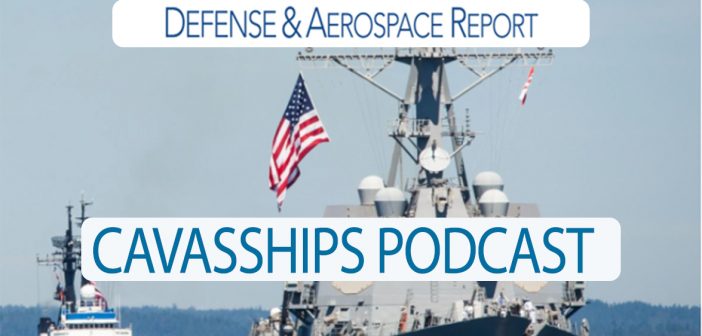Welcome to the CavasShips Podcast with Christopher P. Cavas and Chris Servello…a weekly podcast looking at naval and maritime events and issues of the day – in the US, across the seas and around the world.
This week, if there’s any one thing each one of us shares, it’s the need for sleep. The need for truly restful sleep – and the lack of getting enough it – has become a core issue for the US Navy in recent years, especially following the 2017 destroyer collisions where fatigue was cited as a key factor in how fatal mistakes were made. A new sleep policy was issued late last year by the Navy directing changes in watch schedules to give sailor more rest, but challenges remain in implementing real changes while at sea aboard a 24/7 warship. We’ll talk with the US Navy’s top sleep expert, Dr John Cordle, a retired Navy Capitan, about what’s needed, what the Navy is trying to do, and whether or not it’s working.
In this Week’s Squawk Chris Cavas has France on his mind.
Please send us feedback by DM’ing @CavsShips or @CSSProvision or you can email chriscavas@gmail.com or cservello@defaeroreport.com .
This Week’s Naval Round Up:
The ballistic missile submarine USS WYOMING launched two unarmed Trident II missiles September 17 off Cape Canaveral, Florida in a successful test of the Life-Extended D5LE missiles and of the sub’s launch systems. WYOMING completed a 3-year refueling overhaul a year ago and the launches were part of the qualification process ahead of its first post-overhaul strategic patrol.
On September 19 a US Navy T-45C Goshawk training jet crashed in Lake Worth, Texas. The two pilots aboard the plane – an instructor and student – each ejected but were injured, the student in serious condition. The aircraft was assigned to Training Air Wing Two out of Naval Air Station Kingsville, Texas.
The fast transport ship CHOCTAW COUNTY arrived at Beirut, Lebanon September 20 to begin the first-ever central partnership mission under US Naval Forces Central Command. The missions involve unit-level and one-to-one exchanges about a variety of missions, including mine countermeasures, explosive ordnance disposal, disaster response and public health and construction practices. Similar missions have taken place in Latin America, Africa and Asia, but this is a first for the Bahrain-based US NAVCENT.
A steel-cutting ceremony for the British Royal Navy’s first Type 31 frigate was held September 23 at Babcock’s new facility in Rosyth, Scotland. HMS VENTURER is the first of five Type 31s that will replace the Royal Navy’s general-purpose Type 23 frigates. VENTURER is to launched in 2023.
In Washington the Senate Armed Services Committee this week publicly released its version of the fiscal 2022 defense authorization bill. The measure, approved by the committee in July, has yet to reach the Senate for floor debate. The House on September 23 approved its version of the $768 billion policy bill by a vote of 316 to 113. The bill includes three Arleigh Burke-class destroyers – two more than the Pentagon requested and two Virginia-class attack submarines. Notably the bipartisan bill added about $25 billion to the Biden administration’s request. Neither the House or Senate, however, have yet to approve their FY22 defense spending bills, and with the end of the fiscal year coming next week a continuing resolution is expected to allow the government to continue to function.
An interesting provision of the House defense authorization bill would invite Taiwan to participate in the 2022 Rim of the Pacific, or RIMPAC, exercise. If adopted by the full Congress and signed into law, it would mark the first time Taiwan has been invited to take part in the world’s largest naval exercise, held every two years in waters around Hawaii. The People’s Republic of China took part in several RIMPACs in recent years but was specifically excluded in 2018. Five Chinese Navy ships took part in the 2016 RIMPAC. Taiwanese participation in the exercises has been proposed on several occasions but never approved by the US.
This Week’s Squawk by Chris Servello:
French warships were in US ports this week. The nuclear-powered submarine Amethyste was at Norfolk, the frigate Aquitaine welcomed visitors in Baltimore. Amiral Pierre Vandier, chief of staff of the French Navy, was in Washington and met with the US Navy’s top leadership. They were here to mark the 240th anniversary of the Battle of the Capes, where a French fleet in 1781 defeated a British fleet in Chesapeake Bay and prevented the resupplyof the British Army at Yorktown. Thus trapped, the British Army surrendered to George Washington, effectively bringing to a close the American Revolution and guaranteeing the United States independence from Britain.
The newly-announced AUKUS submarine deal with Australia meant the cancellation of France’s biggest-ever foreign military sales deal. The French are mightily mad about the way the deal was rolled out, and there have been numerous statements in the media as to the shortcomings not only of the French submarines for Australia but – especially in social media – as to perceived shortcomings of France as a capable military and reliable ally. Nothing could be further from the truth.
Professional naval people for many years have expressed to me their admiration not just of the French military, but also of the French Navy. Comments like “the most professional Navy out there,” “they really know their stuff,” “very capable” and “very effective” are common. I’ve had the opportunity to visit a number of French warships and shipyards, including a nuclear submarine, and they are nothing if not impressive. Their forward-leaning naval posture in the western Pacific, especially over the past year, has been an effective element in a larger multi-national effort to demonstrate military and political resolve in the face of relentless Chinese pressure and expansion. That they are exhibiting a high level of pique at the abrupt cancellation of the Australian submarine deal is understandable – and very French.
Both the Americans and the French routinely mention that France is America’s oldest ally. But there is some serious fence-mending to be done with our ego-bruised ally. Those efforts are already under way, but they need to continue. We need them.




